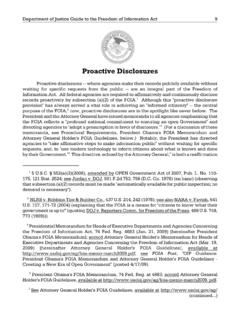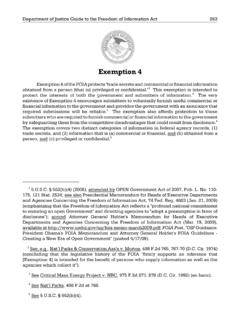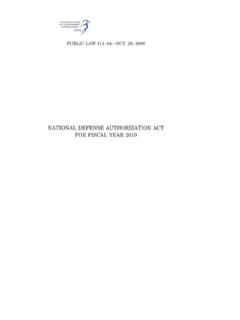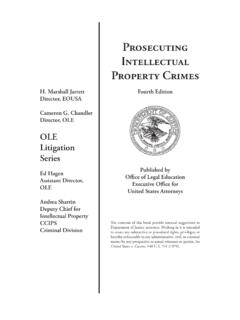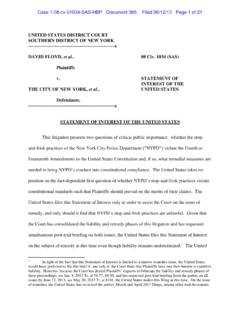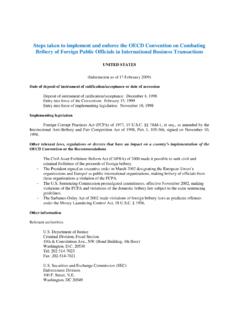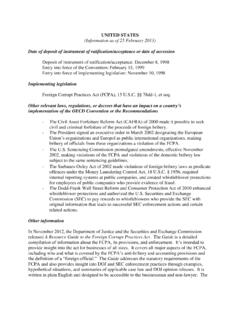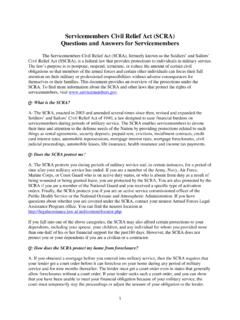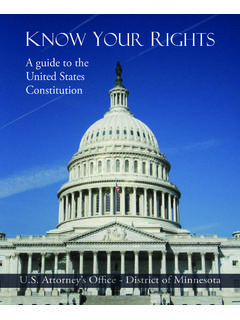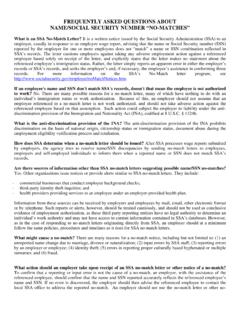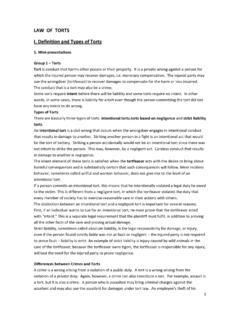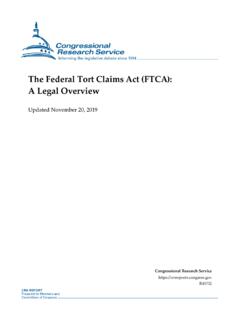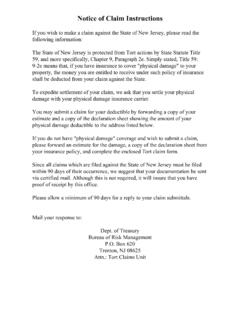Transcription of Federal Tort Claims Act - United States Department of Justice
1 Federal tort Claims ActPersonal Liability tort Litigation Against Federal Employees .. 1By Paul Michael BrownThe Statute of Limitations of the Federal tort Claims Act as aJurisdictional Prerequisite to Suit and the Implications for EquitableTolling .. 13By Adam BainAn Underutilized Defense: State Statutes of Repose as a Bar to FTCAM edical Malpractice Actions .. 27By Jason R. CheekLitigating Venue in Federal tort Cases .. 30By Adam BainAffirmative Contribution, Indemnification, and Subrogation ClaimsArising in FTCA Cases .. 46By Jack WoodcockRaising State Pre-Litigation Screening or Certificate of Merit Statutes inFTCA Medical Malpractice Actions .. 50By Debra R. Coletti November 2010 Volume 58 Number 6 United StatesDepartment of JusticeExecutive Office forUnited States AttorneysWashington, DC20530H.
2 Marshall JarrettDirectorContributors' opinions andstatements should not beconsidered an endorsement byEOUSA for any policy, program,or United States Attorneys'Bulletin is published pursuant to 28 CFR (b).The United States Attorneys'Bulletin is published bimonthly bythe Executive Office for UnitedStates Attorneys, Office of LegalEducation, 1620 Pendleton Street,Columbia, South Carolina 29201. Managing EditorJim DonovanLaw ClerksElizabeth GaileyCarmel MatinInternet article submissions andaddress changes to ManagingEditor, United States Attorneys' Bulletin,National Advocacy Center,Office of Legal Education,1620 Pendleton Street,Columbia, SC This IssuePersonal Liability tort LitigationAgainst Federal EmployeesPaul Michael BrownSenior CounselConstitutional Torts StaffTorts Branch, Civil DivisionEvery year, thousands of current or former Federal employees are named as defendants in civilsuits asserting Claims against them in their individual capacity and seeking to recover money damagesfrom their personal assets.
3 Usually, these Claims sound in tort and are defended by attorneys in theDepartment of Basics of individual capacity representationThe Department of Justice (DOJ) has long recognized that personal liability tort Claims againstfederal employees implicate the interests of the United States . Accordingly, 28 517 authorizesDOJ attorneys to defend these Claims in accordance with guidelines found at 28 See also USAM capacity representation is available for current or former Federal employees who havebeen sued, subpoenaed, or charged in their individual capacities." 28 (2010). Theguideline, however, does not define those terms. In some cases, a complaint is so poorly drafted that it isdifficult to ascertain if a personal liability claim has been asserted.
4 DOJ attorneys should look for threethings when evaluating a case: (1) whether the employee is named in the caption as required by Fed. P. 10(a); (2) whether there is an allegation that the employee acted wrongfully; and (3) whether theprayer for relief seeks monetary damages. If all three of these things are present in the complaint, theemployee can and should request individual capacity capacity representation by a DOJ attorney is not mandatory. A Federal employee mayretain counsel at his own expense, but this is rarely done. Most employees prefer representation by a DOJattorney because there is no cost to the employee. The guidelines require that employees seekingindividual capacity representation make a request through their employing agency.
5 28 (a)(1) (2010). Unless the request is "clearly unwarranted," the agency is obligated to forward it tothe appropriate litigating division, along with the court papers served on the employee and an "agencystatement." Id. Usually, requests for individual capacity representation go to the Civil Division. Theoverwhelming majority of these requests are handled by the Constitutional Torts Staff in the TortsBranch. The Tax Division, however, often handles requests from employees at the Internal RevenueService in suits arising from their efforts to collect income taxes. Requests made in suits challenging theadequacy of medical care for incarcerated persons, however, should be directed to the Federal TortClaims Act Staff in the Torts capacity representation involves a two-part test.
6 First, the conduct giving rise to theclaim must have occurred while the employee was working within the scope of Federal , it must be in the interest of the United States to assign a DOJ attorney to provide a defense forNOVEMBER 2010 United States ATTORNEYS BULLETIN1the employee. 28 (a)(2) (2010); USAM (B). The litigating division reviews thecomplaint, the agency statement, and any supporting documentation to determine whether these twoconditions are met. In the overwhelming majority of cases, this review is routine and the employee'srequest is approved as a matter of course. However, in difficult or novel cases, and in cases where initialreview suggests the request should be denied, the matter is sent to a higher office for a decision.
7 In theCivil Division, these cases are forwarded to the Deputy Assistant Attorney General, who oversees theTorts Branch. The Deputy may, at her option, convene the Civil Division Representation Committee toprovide additional analysis and individual capacity representation is approved, the DOJ attorney assigned to defend theemployee enters into a "full and traditional attorney client relationship," and all communication betweenthe employee and the Department attorney is privileged. 28 (a)(3) (2010). Accordingly,care should be taken to ensure that privileged material is clearly identified and segregated in the case counsel employed by any DOJ component are also bound by the privilege and should take thesame precautions.
8 Id. Counsel employed by other agencies, however, have the option of being bound by the DOJ attorneys representing employees of agencies other than the DOJ should ascertain early in thelitigation whether agency counsel agree to be bound by the privilege and must then carefully memorializecounsels decision in the case file. If agency counsel opt out of the privilege, Department attorneys shouldtake care to avoid any communications with agency counsel that might waive the guidelines on individual capacity representation include a number of terms and 28 (a)(8)-(12) (2010). These terms and conditions are set forth in the DOJ-399 form,which can be obtained from the Constitutional Torts Staff.
9 DOJ attorneys representing current or formerfederal employees in their individual capacities should ensure that the client completes this form and thatit is made part of the case Federal employees have purchased professional liability insurance. To date, there are threecompanies selling this coverage: Federal Employees Defense Services, Mass Benefits Consultants, andWright USA (formerly Wright & Company). Any Federal employee who serves as a "law enforcementofficer," "supervisor or management official," or a "temporary fire line manager" is eligible forreimbursement "not to exceed one-half" of the premium paid for professional liability insurance. Pt. III, Subpt. D, Ch. 59, Subch. IV. (Refs & Annos) (2010).
10 DOJ attorneys are eligible forreimbursement as well. FINANCIAL MANAGEMENT POLICIES & PROCEDURES BULLETIN, No. 05-17 ( , 2005). The DOJ counsel assigned to represent Federal employees in their individual capacities shouldinquire at the outset as to whether the employee carries professional liability insurance. If so, the carriershould be promptly notified of the pending suit and kept informed as the litigation Types of personal liability Claims sounding in tort against Federal employeesThree types of personal liability Claims sounding in tort are typically asserted against federalemployees in their individual capacity. First, there are personal liability Claims premised upon an allegedviolation of the Constitution.
